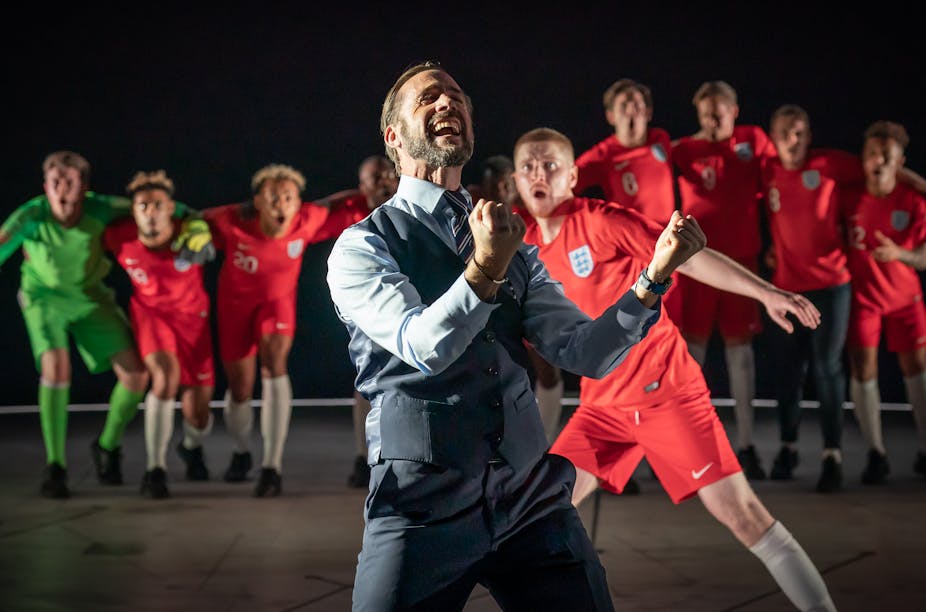Dear England, a play about football manager Gareth Southgate, immaculately encapsulates the light and dark sides of the game.
At the start of the play – which recently transferred to the Prince Edward Theatre – Southgate watches his earlier self missing the crucial penalty against Germany that sent the men’s England team crashing out of the Uefa Euro tournament in 1996. It’s an old wound that refuses to heal.
The loss sparked dejected England fans to vandalise German cars, and burn Southgate effigies. Despite his emotional baggage, circumstances thrust Southgate into the managerial role 20 years later.
The play shows how he selected a young, talented, multicultural squad. But also how he sensed that for them to survive the pressures of expectation, he needed to cultivate a supportive, collective culture that transcended violent, racist, hyper-masculine football narratives.
Sport on stage
Portraying football on stage is tricky, but the superb staging – featuring a centre circle and a hovering illuminated halo intimating the iconic Wembley arch – provides an evocative setting.
Joseph Fiennes’s portrayal of Southgate is masterful, embodying his essence with nuanced mannerisms and timbre, without resorting to caricature. Southgate is portrayed as self-deprecating, an unlikely leader and a reluctant figurehead. Brought in to provide stability, he enacts revolutionary change.

Playwright James Graham’s script is witty. Harry Kane’s (Will Close) depiction as an awkward communicator with a curious voice steals the most laughs. This poignantly pays off later when the audience is humbled by listening to the character lamenting that people denigrate him for his vocal shortcomings.
Jordan Pickford’s (Josh Barrow) character adheres to the stereotype of the goalkeeper as a “crazy man”, but is amusingly endearing. A liberal amount of swearing had the audience creasing up, while epitomising the gritty underbelly of football. There was a broad range of famous character cameos, adding interest and jovial familiarity, but sometimes smacking of Spitting Image.
Southgate’s tactics
The play also explores the existential crisis of what it means to be the England team. In an age of increasing societal division and inequality, who and what do the team want to be, and represent?
Southgate urges the players to contribute to the vision and take responsibility for co-constructing a modern football identity. Their challenge is to move beyond the football superiority complex of the past, to forge a spirit of togetherness and belief.

Psychologist Pippa Grange (Dervla Kirwan) is recruited to help players confront their fears and confide in one another about insecurities. Southgate displays much soul-searching in overcoming his own traumas, and in attempting to bind the group together. Grange’s character is almost a manifestation of Southgate’s consciousness, as he attempts to enact change in himself and others.
Penalties in the play
Penalties, the ultimate high-pressure football test, are a significant part of this drama, acting as a vehicle through which Southgate encourages the players to fear less and to find strength and love in unity.
England broke their run of bad penalty shoot-out luck under Southgate in the 2018 World Cup. But they then lost the subsequent one in the Euro 2020 final, where Southgate’s decisions unintentionally exposed unsuccessful penalty takers Marcus Rashford, Jadon Sancho and Bukayo Saka to racist abuse.
In Dear England, Southgate comes across as a quietly heroic, decent man, cultivating a culture where players are empowered to take the risks necessary to achieve greatness. Ultimately, Southgate and England learn how to play with joy, lose with dignity, survive trauma and emerge in more meaningful roles.
For Southgate that means supporting others compassionately to achieve in the psychologically safe environment he did not experience himself.

We still lack the unwritten final act denouement, which for England managers is rarely satisfying. Euro 2024 is likely to be Southgate’s last tournament as national manager, but he will surely embrace the challenge, and try once more.
Fundamentally, Dear England is a feelgood play, as evidenced by the enthusiastic standing ovation, clapping and singing of Sweet Caroline at the performance I attended. Dear England exceeded my expectations, and its unusual fare might attract a non-traditional theatre audience to bravely shelve their doubts and with an open-heartedness, connect with a different story.

Looking for something good? Cut through the noise with a carefully curated selection of the latest releases, live events and exhibitions, straight to your inbox every fortnight, on Fridays. Sign up here.

